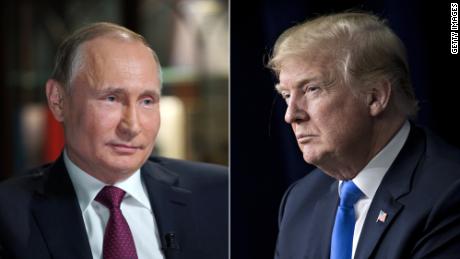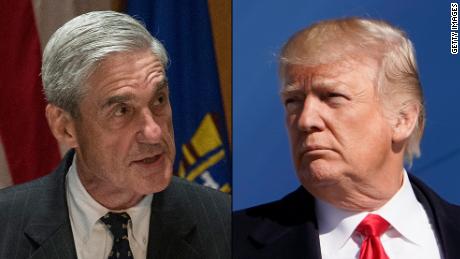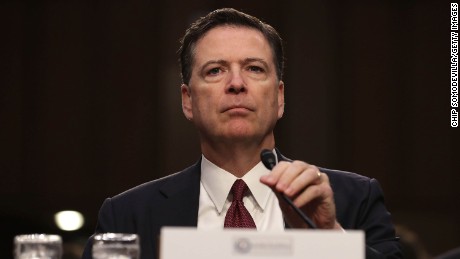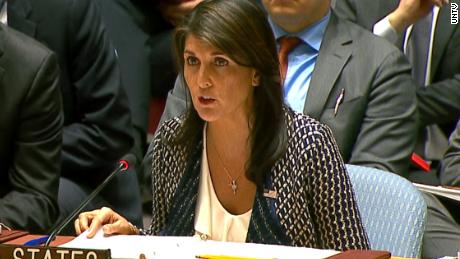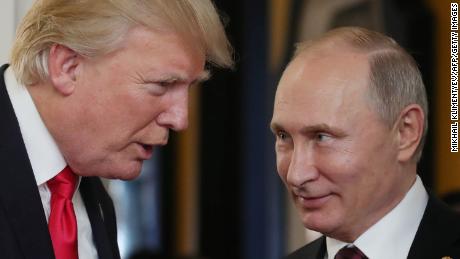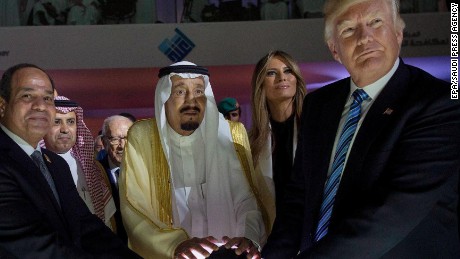Story highlights
- The two men have not met in person since Trump entered office
- Since Trump's inauguration, hopes have dimmed for a reset
Washington (CNN)Inside the capacious Hamburg Messe conference hall next month, President Donald Trump will come face-to-face with the man whose shadow has darkened much of his presidency: Vladimir Putin.
The two men have not met in person since Trump entered office five months ago under a cloud of suspicion about his campaign's ties to Russia.
Trump has yet to raise the issue of election meddling with the man who US intelligence officials say personally ordered and closely monitored attempts to influence last year's presidential contest in Trump's favor.
And while both the White House and the Kremlin say there have been no formal preparations for sit-down talks, there's little doubt among officials in both countries that Trump and Putin will interact when they both attend the Group of 20 talks, held this year in the northern German city at the beginning of July.
On the sidelines of last year's G20, Trump's predecessor Barack Obama confronted Putin over the cyberhacking, but the damage had largely been done. This year, Trump will find himself under pressure to raise the issue again -- but had shown few signs that he's willing to accuse Putin of taking steps that were meant to help him win the presidency.
Since Trump's inauguration, hopes have dimmed for a reset in ties between the two countries amid new disputes over Syria and Ukraine. Trump has vowed to seek out new areas of cooperation with Moscow, but has instead overseen a rise in tensions.
US and Russian officials this week have scaled up their rhetoric, placing new frost on the relationship.
Monday, Moscow threatened to down US fighter jets battling ISIS in retaliation for a US shoot-down of a Syrian government warplane.
Tuesday, the Trump administration slapped new sanctions on Russia for its actions in Eastern Ukraine.
And Wednesday, Russia said it was canceling talks with US officials meant to improve relations between the two countries, claiming Washington had scuttled chances for cooperation.
Those are on top of the already-existing dispute between the US and Russia over last year's election hacking. This week, Jeh Johnson, the top homeland security official under Obama said that Putin had directed the cyber attacks himself.
"In 2016, the Russian government, at the direction of Vladimir Putin himself, orchestrated cyberattacks on our nation for the purpose of influencing our election -- plain and simple," Johnson said at a House intelligence committee hearing.
Meanwhile, multiple investigations into Trump associates' contacts with Russian officials are proceeding apace, a swirl of controversy that has preoccupied Washington, including Trump himself. Any talks between the two leaders in Hamburg will occur with the Russia cloud as their backdrop, even as the White House has tried to move on.
"I think that we will meet at some point, that's for sure," Putin told the American film director Oliver Stone in an interview aired on Showtime this month. "But we are not pressing anyone for a meeting."
'We cannot exclude the possibility'
At the White House on Friday, press secretary Sean Spicer said a meeting between Presidents Trump and Putin is possible on the sidelines of the G20.
"We have a lot of countries the we will probably have bilaterals with on the sidelines of the G20," Spicer told reporters at an off-camera briefing. "I think that he understands that we have a role -- to the extent that we can work with Russia to solve some problems and to cooperate. If we can find that willingness then we would like to do it."
Speaking from Moscow on Wednesday, Kremlin spokesman Dmitry Peskov said in response to a question from CNN that a meeting between the two leaders at the G20 summit is "not being prepared in any way."
"We cannot exclude the possibility that in one way or another, they will of course meet each other in some or the other format on the sides of the summit," Peskov went on. "But there are no specific agreements or preparations so far."
A senior Trump administration official also said there were no formal plans for Trump and Putin to meet in Hamburg, where the leaders of 20 of the world's richest nations will gather for the yearly conference.
But officials in both countries suggested that, at a minimum, an informal meeting between Trump and Putin is likely, akin to the pull-aside talks that President Barack Obama conducted with Putin at the past two G20 meetings, in Antalya, Turkey, and Hangzhou, China.
"It would be hard for them to avoid each other," said one US official familiar with plans for the summit.
Still, the lack of formal preparations hasn't curtailed global anticipation.
"If you ask me what the highlight of the G20 summit will be, I would reply that it will be the meeting of Putin and Trump, if it takes place," said Alexy Pushkov, the chairman of the Information Policy Committee in Russia's upper house of parliament, during a visit to Berlin on Tuesday.
"Trump, being under pressure from his political opponents, has had no opportunity to meet with Vladimir Putin," Pushkov said, according to the TASS Russian news agency. "I think that a lot will depend on this meeting, that is why it is so highly anticipated everywhere -- from Tallin to Lisbon, from Beijing to Cairo."
When Trump and Putin do eventually meet, leaders in capitals around the world will be closely eyeing the session for clues about the dynamic between the two men. Putin and Obama had a notoriously icy relationship that accompanied a steep decline in relations between the US and Russia.
New era?
Moscow hoped Trump would usher in a new era of relations. Russian officials were cheered by Trump's praise of Putin on the campaign trail, and his expressed desire to find ways to cooperate in battling terrorism.
Despite a parade of foreign leaders to Trump's White House, however, no invite has been extended to Putin. Trump did hold an Oval Office meeting with Russian Foreign Minister Sergey Lavrov and Russian Ambassador to the US Sergey Kislyak, and photos taken by Russian state media showed a jovial reception.
But there's little sign the Trump administration plans to drop the Obama-era positions that spurred new enmity between the Cold War-era rivals. The US has maintained that Syrian leader Bashar al-Assad must leave power, a stance Russia argues violates Syrian sovereignty. And the Trump administration has shown no signs it will let up on its demands that Russian forces leave Eastern Ukraine, even though Trump himself suggested during the campaign that Russia had not annexed the Crimean peninsula.
"Until they are out of Eastern Ukraine, we're going to continue to have sanctions on Russia," White House press secretary Sean Spicer told reporters on Wednesday.
This week, Ukrainian President Petro Poroshenko met at the White House with Trump in an attempt to color his thinking on the conflict ahead of the US president's first interaction with Putin. Speaking with reporters, Poroshenko said he was eager to get in Trump's ear before the Russian president.
"It is very important that my meeting ... will be earlier than Putin's meeting," Poroshenko said, according to an official presidential news service, adding that it was necessary for "everyone to be armed with information."
The appeals seemed to work, at least for now. The US tightened sanctions on Russia Tuesday in a bid to force the end of its occupation of Crimea, prompting the angry cancellation of planned talks between officials that were scheduled for this week.
"After yesterday's decision on sanctions, the situation does not allow for a round of such a dialogue, especially as there is no content for it, since Washington didn't offer nor is offering now anything specific," the Russian Foreign Ministry said.
Russian election meddling
What's less clear is how Trump plans to confront Putin about Russia's meddling in last year's election contest. During his talks with Putin at last year's G20 in China, Obama said he told the Russian leader to "cut it out" and that "there were going to be some serious consequences if he did not," according to his own account of the interaction.
Trump, however, hasn't shown the same willingness to raise the election meddling issue. Spicer said on Wednesday that he didn't know whether Trump believes Russia interfered in the 2016 election, despite a US intelligence consensus that Putin himself ordered the hacking in an attempt to bolster Trump's prospects.
Trump, who remains deeply sensitive about suggestions that Russia somehow helped win him the presidency, hasn't spoken at length about the meddling, though he has kept in place economic sanctions placed on Russia in response to the hacking.
For Putin, who has denied all allegations that his government oversaw a widespread attempt to sway the US political contest, a meeting could act as a way to feel out Trump on the issue.
"President Trump needs to shape his stance on key issues in coordination with his partners," Putin told Oliver Stone in the televised interview. "I hope that we will be able to find common ground, so that we can understand each other. We need to launch a substantial dialogue with the US side."







